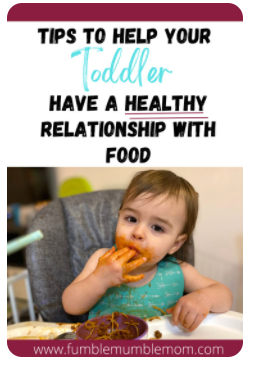We all want our children to be healthy. We often think about fruits, vegetables, proteins, vitamins and nutrients when considering healthy eating habits for our toddler.
Those topics are vitally important, but what’s often overlooked is our child’s relationship with food.

It starts with you.
First, I will openly admit I do NOT have a perfect relationship with food. In fact, I have been at least a little overweight for almost all of my life.
I am actively working on my perception of food and myself.
I want my children to have a naturally healthy relationship with food and these are the habits that we have implemented to encourage that:
Eating at the table:
Lunch and dinner are ALWAYS at the table. I feel this is important for not just healthy eating habits but also for healthy relationships. When we eat at the table together as a family we interact and connect differently than when we’re distracted by play, work. chores, etc.
I’ll admit. A lot of times breakfast foods and snacks are not at the table. I am not a morning person and my munchkin wakes up and is almost immediately rubbing her tummy saying “mmmm” (her adorable cue for telling me she’s hungry).
No screens:
The television is turned off. If it’s just my daughter and I (my husband works odd hours), I will sometimes put on some music to jam and wiggle to as we eat. Sometimes it’s pop, country, rock, etc. other times I put on classical music.
I do make it a point not to be on my phone during mealtime as well.
I’ve read multiple articles that conclude that watching television while eating can lead to overeating and may increase the risk for childhood obesity.
I whole heartedly agree with these findings. I know from experience. Since I have stopped eating while watching TV (something I’ve done since I was a child) I find that I am more aware of how much I’m eating and notice myself feeling satisfied sooner.
Variety:
Since my daughter has started eating solid foods I have tried to buy fruits, vegetables and spices that were previously not on my grocery list. I’ve tried recipes that were out of my comfort zone.
How can I expect her to try new things if it’s unusual for her to see new things on her plate? This is a skill. Skills come easily for some and take practice for others.
I’m hoping starting this early will work to my benefit down the road when picky eating can really ramp up.
Reintroduction:
Many specialist suggest that babies and toddlers may need to try a food multiple times (could be 20+!) before they enjoy, or at the very least, accept it. It can be frustrating when your child is mashing, smearing, throwing, or spitting out new foods but this is also a natural part of their development.
I try a balance between ignoring these behaviors and firmly letting my child know it’s not acceptable.
Really the only one I try to strongly discourage is throwing her food. I let her know she doesn’t have to eat it but it does not go on the floor. I let her hand it to me. For a long time she would put food in her drink holder cubby that she didn’t want and I actually encouraged that.
Helping clean up:
While we’re on the subject. If my daughter throws food on the floor I often make her help me clean it up.
I also let her clean her hands and face – when she’s willing.
Once she’s a bit older I will have her help load her plate and utensils into the dishwasher as well.
No pressure:
I do not EVER make my child eat or try any foods. I might casually offer a bite once or twice throughout the meal, but if she declines I let her know it’s okay and she doesn’t have to eat it. Honestly, a majority of the time she WILL try it on her own.
I decide what is cooked and she decides IF and how much she will eat.
The child decides when they're done:
We do not, and will never have a “clean your plate” mentality. I cannot read my child’s mind. I do not know if she has had enough to eat, only she does. Sure I can make a reasonable assumption based on how much she usually eats but, especially when they are this young, their appetites fluctuate so much that I cannot truly know for sure.
I do not want to encourage her to eat past the point of satisfied.
I start with smaller portions and ask her if she wants more to help not waste as much food.
Not praising for eating a lot:
I caught myself saying things like, “Good job, you ate a lot!” when she first started solids or when she would eat more after a spell of not eating much. I do not want her to associate praise with portions. I do praise her for trying new foods though.
Conscious of labeling foods:
Good, bad, naughty, special, yucky these are all words that I try not to associate with food. One reason I try not to do this is that I do not want her to be discouraged to try a new food because my husband or I don’t like it.
Another reason is that she is not old enough to understand why some foods are better for us than others, and kids tend to take words literally.
I do want to bring benefits of foods into our conversation in terms she can understand, I want to be conscious and intentional.
Include comfort foods:
My child eats what my husband and I are eating (most of the time). I may need to cut it differently, omit nuts or other potential choking hazards but overall she is eating the same. I do not make separate meals specifically to accommodate her.
While I think this is important, I also always have something I know she likes on her plate as well though. Usually something like cheese, fruit, cottage cheese, yogurt, etc.
Not only do I think this helps her be less picky (she’s still a toddler with a very strong will so she definitely still has picky moments) but I think it encourages her eat something that may not be as appealing.
Appetite is a funny thing. I feel like once she starts eating her appetite moves to a priority over her skepticism.
Practice, not perfection...
Although I try to practice these every single day, I fall short. I mess up. I give into laziness. We’re traveling. I’m tired. My child is sick.
Life is not black and white, and every day is different. If my daughter is not feeling well I’ll probably serve her more of her comfort foods or prepare meals I know she likes. Grandma has been known to put on a cartoon at mealtime.
Some of the guidelines I have set to encourage a healthy atmosphere have come easily, others I am still working on.
Every family is also different, these guidelines may not be a perfect fit for your family so freely alter them for you!
Are there some tips you have surrounding food relationships that weren’t mentioned?



This is really a boon for parents of picky eaters. Thank you for this elaborate article
Thank you so much for stopping by and taking the time to comment!
These are all amazing tipe. I too am struggling with my toddler and preschooler being very picky with food leaving me total confused as to what to cook for them each day!
Most of us have been there! My daughter’s eating habits change by the week. One week she will try anything new I put in front of her, other weeks she will only eat the one or two comfort foods I put on her plate. They sure do like to keep us on our toes!
These are very helpful tips. Sometimes, we fall into the trap of some of these mistakes and that doesn’t help our kids or us. Thanks!
We absolutely all fall into this, it’s hard not to! Life his hectic and we want our kids to eat! It’s all about making those less favorable habits the exception instead of common practice.
I used to struggle with feeding my daughter, but I have implemented some of the strategies above and have found some success. Like you, we try not to do screen time during meals, and I would opt to play some music instead. Whenever I do that, my daughter actually eats more and faster, because there are no other distractions and she enjoys her food better. Thanks for sharing this great article. You have some really great pointers here!
Thank you! Screen time during meals was a hard one for me to break, but ultimately I’m so glad I did. Not just for my daughter, but for myself! I’m so glad it’s helped you and your daughter as well!
I love how detailed this article is. It’s a needed read for parents who just weaned their babies. Thank you!
Thank you! Transitioning to solids is a big change for everyone!